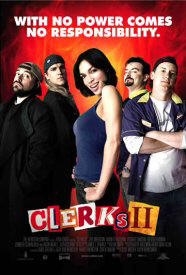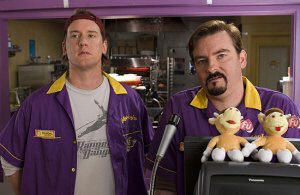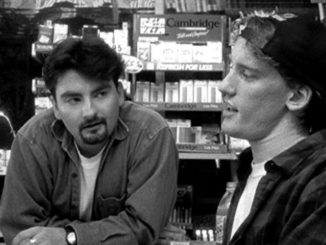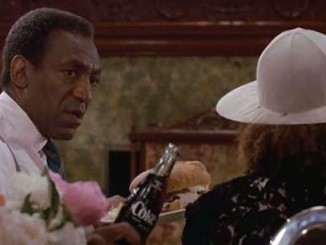 Whoever coined the phrase “You can’t go home again,” may want to re-evaluate that sentiment after viewing writer/director Kevin Smith’s Clerks II, his sequel to the 1994 indie comedy that launched his career. Although Smith’s subsequent movies have featured the cross-pollination of characters, this is the first time he has re-visited the two convenience store counter-jockeys who spend their days dealing with surly customers.
Whoever coined the phrase “You can’t go home again,” may want to re-evaluate that sentiment after viewing writer/director Kevin Smith’s Clerks II, his sequel to the 1994 indie comedy that launched his career. Although Smith’s subsequent movies have featured the cross-pollination of characters, this is the first time he has re-visited the two convenience store counter-jockeys who spend their days dealing with surly customers.
Clerks II presents another day in the strife of counter jockeys Dante (Brian O’Halloran) and Randall (Jeff Anderson). The past decade has not seen much change in their fortunes. A fire at their old job, the Quick Stop convenience store, has sent them to similar positions at the low-rent hamburger joint Mooby’s. The location may have changed, but their attitudes haven’t- they still argue over pop culture, skip out of work and treat customers rudely.
But after ten years of working dead-end jobs together, their lives are about to change drastically as Dante is set to move to Florida with his fiancée Emma (Jennifer Schwalbach), leaving Randall and New Jersey behind. Both of them are apprehensive about this life-altering event, though tensions mount when Randall finally voices his concerns to Dante. To complicate things, Dante finds himself questioning his plans after receiving particular bit of news from his boss Becky (Rosario Dawson).
As with any well made sequel, Smith blends familiar elements from the first Clerks film with new ones for Clerks II. Several jokes from the first film are reprised and then topped. But what is really impressive here is that unlike many comedies hitting the screen recently, Smith knows that a movie can both be funny and still be about something. In this case, Smith is examining what happens when faced with the possibility of giving up the security of an easy job for something new and unknown. This is the choice that Dante faces. This is the type of decision Dante spent the first Clerks film pining for, but now finds himself frozen in fear at actually having to make a choice. Much in the same the first Clerks spoke to the restlessness many of the 20-somethings in its audience felt, Clerks II addresses the issues of coming to terms with responsibility that those same audience members now in their 30s may be wrestling with.
 Both Anderson and O’Halloran give performances that outshine their work from a decade earlier and which add greater depth to their characters. Both actors have also contributed good work to other low-budget and independent films, leaving one to wonder why these guys aren’t getting more mainstream work.
Both Anderson and O’Halloran give performances that outshine their work from a decade earlier and which add greater depth to their characters. Both actors have also contributed good work to other low-budget and independent films, leaving one to wonder why these guys aren’t getting more mainstream work.
Smith’s strong suit has always been his writing, allowing his characters to emerge from monologues and dialogues. However, in Clerks II, Smith presents not one but two important segments as dialogue-less montages with just music on the soundtrack. The two montages actually work in tandem- the first montage features a momentary retreat by Dante and Randall to their uncomplicated childhood which sets up the second where various characters contemplate the uncertain direction their lives will take in just a few hours. These segments form the lynchpin for the film’s finale, and they work perfectly to set things up. Smith has often self-deprecatingly said that he can’t grow as a filmmaker, but his work here is evidence to the contrary.
Previously, Smith had announced that his 2000 comedy Jay And Silent Bob Strike Back was to have been the final chapter in his cycle of inter-related “Jersey films” and his detractors let fly when he announced one more return in the form of Clerks II. However, Smith has crafted a film that is certainly the equal to the original Clerks, and in some ways it’s superior. And while Clerks II serves as a much more fitting ending to his “Jersey Films” cycle, periodic returns to the Quick Stop to check in on Dante and Randall’s lives would be welcome.




